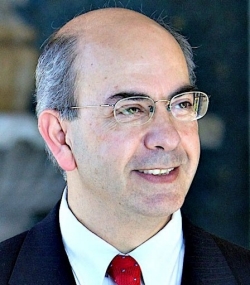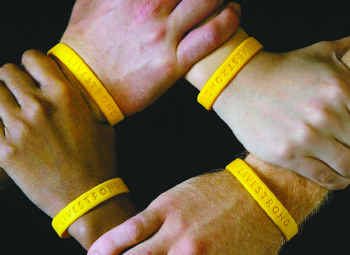WEST LONG BRANCH, NJ– Associate Vice President for Global Initiatives Saliba Sarsar took several dozen students on a virtual trip to the Holy Land

during his poetry reading sponsored by the Monmouth University Honors School, on October 6 .
University students and faculty filled every seat in the Monmouth University Guggenheim Library conference room for Dr. Sarsar’s poetry reading. Sarsar is a political science professor at the University and the author of two published poetry books; Crosswinds and 7 Gates of Jerusalem.
As soon as Sarsar began to speak his command over the room was evident and the crowd fell silent. He spent the next hour reading poems from his most recently published work; 7 Gates of Jerusalem. 7 Gates of Jerusalem contains 49 poems in all, but Sarsar selected 20 to read from the three sections of the book which is divided into; family, neighbors, and places.
Before reading each poem Sarsar described his reason for writing it and the significance it had to his life. His poems read more like short stories because of their descriptive nature, but are just as entertaining and complex and Sarsar’s life.
The tale of Sarsar’s life sounded more like something out of a fiction novel than real life.
And the complex nature of his life goes all the way back to his father’s upbringing. His father was smuggled out of Russia and brought to Jerusalem, as a baby because his mother feared their blood connection to the czars would endanger their lives. His father was then adopted by a Christian woman who also happened to raise Sarsar’s biological mother. His parents are the inspiration of many of the poems in 7 Gates of Jerusalem.
Sarsar grew up a Christian in Jerusalem with seven siblings; it was during his childhood that he experienced many of the hardships that inspire his poetry. When Sarsar was 11 years old the Six-day war occurred in Jerusalem. He was separated from his family for two weeks. For those 14 days he had no idea if his family was dead or alive. When he finally returned home, he learned that his best childhood friend had died. As he read his poem about this situation, titled Pray, the emotion that Sarsar experienced almost 48 years ago could be felt through the reading.
Sarsar came to American in 1974. He said, “I had no expectations coming to America, I was desperate to receive a good education, that was my main goal in life.” Sarsar reached that goal by first attending Brookdale Community College. He then went on to earn a bachelors degree in political science from Monmouth University, and earn his doctorate from Rutgers University.
Although Sarsar is the author of several articles and books about conflict in the Middle East, he still values the creative side of his work. The author said, “Poetry is work of the heart, it is work that makes you belong.” His emotional attachment to each poem was obvious and the audience eagerly listened to each of his poems. Most of his poems are centered on his life in Jerusalem. Sarsar said, “Jerusalem is a symbol of the holy land and what it is going through, it is a symbol of the people in my life, the family the neighbors, and the places combined. Most of my poetry is reflective of that, but also expressing the mystery of life and some of the hard questions that are in existence: Like why war? Why Jerusalem?”
Kevin Dooley, Dean of the Monmouth University Honors School, organized the event and said, “The Honors School hosts events like this in order to expose students to culture.”
Professor Sarsar was an obvious pick to speak at the first event because he teaches at the University and has an extremely cultured background. The Honors School will host more events like this throughout the year in hopes to expose students to different walks of life.
Adriana Eisle, Monmouth University Honors School alumnus, said, “We were always encouraged to come to the honors school events, but they were often dry and felt more like a chore than a privilege. When I heard Professor Sarsar was going to be doing a poetry reading, I knew it would be a privilege to attend. His poems are not only a pleasure to listen to, but they are also educational, I really felt like I learned a lot about Jerusalem by just listening to the poems.”
The event came to a close with Sarsar answering questions from the audience and telling them more information about his life in Jerusalem and America. Sarsar left the students with some words of advice, “Find your passion, pursue your dreams, if you do what you love happiness will come.”




